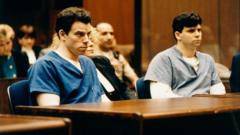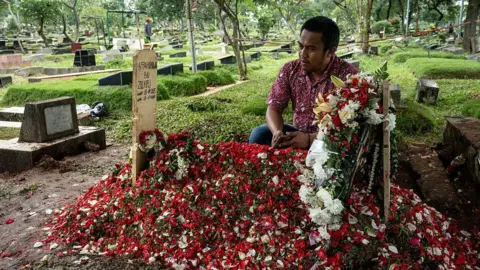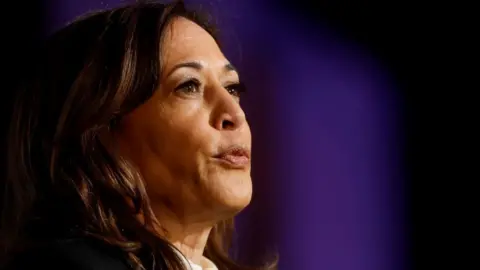In a remarkable twist of cultural reinterpretation, Lyle and Erik Menendez, long vilified for their gruesome murder of their wealthy parents, find themselves amidst a wave of newfound support thanks to contemporary social media influences, including TikTok and Netflix. The brothers, implicated in the brutal 1989 shooting of their parents in Beverly Hills, have been condemned as greedy killers; however, attitudes toward them are evolving.
Once faced with scorn and ridicule, primarily from the media and legal institutions that portrayed them as spoiled brats on a lavish spending spree after the killings, a 35-year hindsight reveals a change in public perception. The brothers’ claims of enduring sexual abuse have sparked empathy in a generation many of whom are unaware of the events unfolding during their crime. Their story is now being retold through podcasts, documentaries, and viral TikTok discussions, framing their narrative within a wider context of trauma awareness.
This week, a Los Angeles judge has made a consequential ruling, opening a pathway for the brothers to potentially gain parole, something that would have been unimaginable in their early trial years. With a hearing slated for next month to discuss their parole prospects, the brothers embrace newfound hope. Socialite and criminal justice advocate Kim Kardashian’s public endorsement of their story has significantly altered the narrative, as she highlights the limited victim resources available during the 1990s that hindered their ability to be understood.
Scholarly perspectives emphasize that today’s cultural climate—marked by the MeToo movement and a better societal grasp of trauma—enables the public to engage with difficult topics like sexual abuse. Whitney Phillips, a true crime researcher, points to the shift in storytelling attitudes that allow for the expression and validation of male trauma that was largely ignored during the Menendez brothers' original trial.
As the Menendez brothers await an uncertain future, their case will ultimately be decided by California Governor Gavin Newsom. With political aspirations looming, Newsom must navigate the complexity of public opinion, particularly as it relates to a case that could ignite fervent media controversy. His approach to such a high-profile case could have serious implications for his political career.
Despite being framed as violent offenders, Lyle and Erik have demonstrated positive behavior in prison, working on rehabilitation initiatives and leading constructive lives behind bars. Every surviving member of their family, who have rallied for their release, claims that the brothers have chosen dignified paths through acts of service established while incarcerated.
As the June hearing draws near, observers speculate on the probability of a favorable recommendation from the parole board and the subsequent choices that lie ahead for Newsom. The governor faces a complex decision that encapsulates both public sentiment and judicial reasoning, as he weighs the implications of granting freedom to two men whose story reverbates deeply through societal, cultural and political landscapes today.
Over the past year, the narrative surrounding the Menendez brothers has transformed from that of reprehensible criminals to potential symbols of a misunderstood trauma, leaving observers and supporters optimistic about the future of a case that stirred national intrigue well beyond the courtroom decades ago.
Once faced with scorn and ridicule, primarily from the media and legal institutions that portrayed them as spoiled brats on a lavish spending spree after the killings, a 35-year hindsight reveals a change in public perception. The brothers’ claims of enduring sexual abuse have sparked empathy in a generation many of whom are unaware of the events unfolding during their crime. Their story is now being retold through podcasts, documentaries, and viral TikTok discussions, framing their narrative within a wider context of trauma awareness.
This week, a Los Angeles judge has made a consequential ruling, opening a pathway for the brothers to potentially gain parole, something that would have been unimaginable in their early trial years. With a hearing slated for next month to discuss their parole prospects, the brothers embrace newfound hope. Socialite and criminal justice advocate Kim Kardashian’s public endorsement of their story has significantly altered the narrative, as she highlights the limited victim resources available during the 1990s that hindered their ability to be understood.
Scholarly perspectives emphasize that today’s cultural climate—marked by the MeToo movement and a better societal grasp of trauma—enables the public to engage with difficult topics like sexual abuse. Whitney Phillips, a true crime researcher, points to the shift in storytelling attitudes that allow for the expression and validation of male trauma that was largely ignored during the Menendez brothers' original trial.
As the Menendez brothers await an uncertain future, their case will ultimately be decided by California Governor Gavin Newsom. With political aspirations looming, Newsom must navigate the complexity of public opinion, particularly as it relates to a case that could ignite fervent media controversy. His approach to such a high-profile case could have serious implications for his political career.
Despite being framed as violent offenders, Lyle and Erik have demonstrated positive behavior in prison, working on rehabilitation initiatives and leading constructive lives behind bars. Every surviving member of their family, who have rallied for their release, claims that the brothers have chosen dignified paths through acts of service established while incarcerated.
As the June hearing draws near, observers speculate on the probability of a favorable recommendation from the parole board and the subsequent choices that lie ahead for Newsom. The governor faces a complex decision that encapsulates both public sentiment and judicial reasoning, as he weighs the implications of granting freedom to two men whose story reverbates deeply through societal, cultural and political landscapes today.
Over the past year, the narrative surrounding the Menendez brothers has transformed from that of reprehensible criminals to potential symbols of a misunderstood trauma, leaving observers and supporters optimistic about the future of a case that stirred national intrigue well beyond the courtroom decades ago.




















